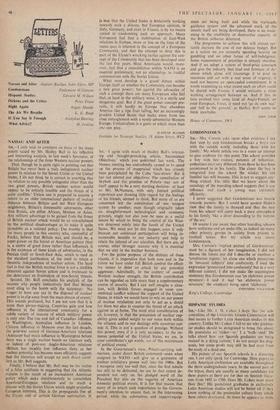Nassau and After Alastair ?talky:, John Men; MP Gordonstoun Endyniion
Wilkinson Hispanic Studies Edward M. Wilson
Dickens and the Critics Peter &SOH Right Again Angus Maude the Air We Breathe L. E. Reed ,
If You Say It Enough A dol ph US Deering
What Advice? II. Jenkins NASSAU AND AFTER
SIR,-1 only, wish to comment on three of the many points raised by Mr. Hedley Bull in his reflective and interesting analysis, in last week's Spectator, of the relationship of the three Western nuclear powers.
First, though he is quite right in pointing out that Britain has never been a truly independent nuclear power in relation to the Soviet Union or the United States, I do not think he is correct in asserting that `in relation to any possible antagonist other than the two great powers, British nuclear action would appear to be entirely feasible and the threat of it quite credible.' Unless one is prepared to assume a return to an older international pattern of mutual defiance between Britain and her West European neighbours, Britain's foreseeable adversaries, other than Russia, are either African, Moslem or Asian. Any military advantage to be gained from the threat of British nuclear attack would be so overwhelmed by the political disadvantages as to make it quite incredible as a rational policy. The trouble is that for many people in this country who, unmindful of Ranke, believe that Britain was, and should be, a super-power on the Soviet or American pattern (that is, a centre of great force rather than influence), it is the existence of these kinds of adversaries, in the Persian Gulf or South-East Asia, which is used as the standard justification of the need to retain a theoretic independence of nuclear action. The hard fact is that the British nuclear force is not a credible deterrent against Soviet action and is irrelevant to the deterrence or frustration a non-Soviet threats.
Second, Mr. Bull concludes his analysts of the reasons why people instinctively feel that Britain must cling to the bomb with the statement: 'No tenger to have any say in the disposal of nuclear power is to slip away from the main stream of events.' This sounds profound, but I am not sure that it is more than phrase-making. Countries gain and lose influence in the international community for a subtle variety of reasons of which military power is only one The rise and fall of Canadian influence in Washington, Australian influence in London, Chinese influence in Moscow over the last decade, the post-war record of German-American relations (Adenauer had much influence in Washington before there was a single nuclear bomb on German soil), or indeed of post-war Anglo-American relations (Britain has steadily lost influence there as her nuclear potential has become more efficient), suggests that the historian will accept no such direct corol- lary as Mr. Bull suggests.
Finally, I believe that Mr. Bull may be the victim of a false antithesis in suggesting that the Atlantic malaise is the result of an inconsistent American policy which seeks simultaneously to consolidate American-European relations and to reach a détente with the Soviet Union which might prejudice European interests. This is the propaganda line of the tlysee and of certain German nationalists. It
is true that the United States is tentatively working towards such a détente, but European opinion, in Italy, Germany, and even in France, is by no means united in condemning such an approach. Many Europeans feel that a stabilisation of East-West relations in Eurbpe, more or less on the lines of the status quo, is inherent in the concept of a European Community, and that the attempt to deny this is part of the Elysee's wrecking tactics against the con- cept of the Community that has been developed over the last five years. Most Americans would, more- over, feel that a consolidation within NATO is an essential preliminary, not an alternativ„e. to fruitful conversations with the Soviet Union. .
What must develop is a grand debate within Europe itself on whether the Community can become a new great power: for against the advocates of such a concept there are many Europeans Who feel that, at least in the military sense, it is a sterile and dangerous goal. But if the great power concept pre- vails, it will hardly be Europe that abandons America like a ripe fruit falling, but an increasingly prudent United States that backs away from too close entanglement with a newly adventurist Western Europe. Unilateralism is a game at which more than one can play.
ALASTAiR BUCHAN
Institute for Strategic Studies, IS Adam Street, WC2






























 Previous page
Previous page